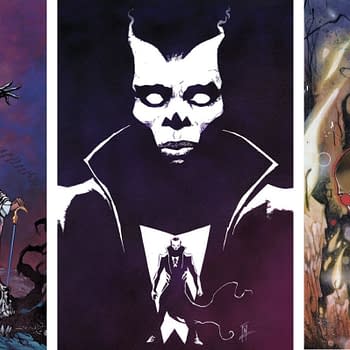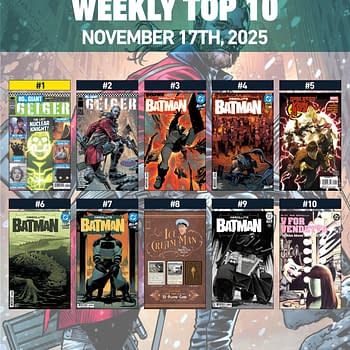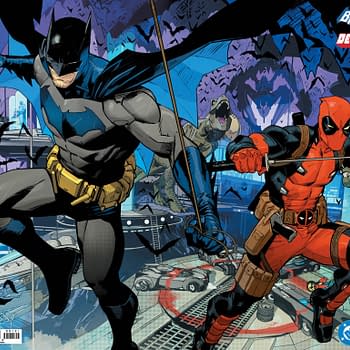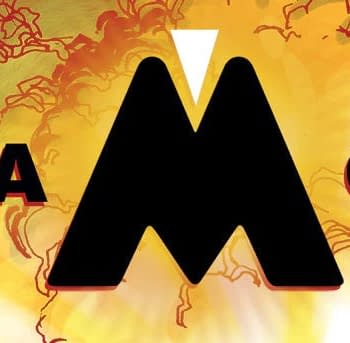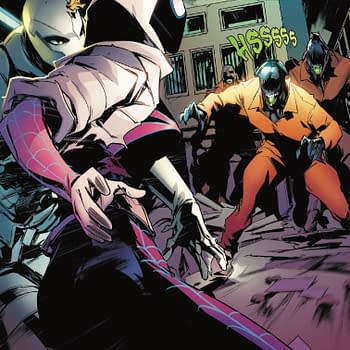Posted in: Comics, san diego comic con | Tagged: chuck rozanski, comic con, Comics, entertainment, san diego, san diego comic con, sdcc
Does San Diego Comic Con Mean The End Of The Direct Market? Chuck Rozanski Speaks
Chuck Rozanski, owner of Mile High Comics is exhibiting at San Diego Comic Con. And he has something to say. He writes, from his store's newsletter,
Every year, I work to compose daily reports from the San Diego Comic-Con International. In those reports I try to provide everyone who reads this newsletter with our own perspective on how this epic comics convention is evolving, and what that might mean for the future of the comics world. I believe that today's newsletter has a particularly disturbing message, which may, or may not, foretell very negative changes for the network of comics retailers who provide most fans with access to their weekly comics. I will let you decide…
I will begin by stating that we are not (at least for now…) succeeding in meeting our minimum financial requirements at this year's San Diego show. In some regards this is not surprising, as we needed to have a steady $1,200 per hour passing through our cash registers during all 41 hours of the convention, simply for us to cover our costs of setting up our seven huge booths. That was such a lofty cash flow requirement that I had significant doubts that we could reach that level, even before we arrived in San Diego. On the other side of the coin, however, we DID exceed that $1,200/hour requirement during the Denver Comic-Con last month, so I had a cautious optimism that we would also succeed here. Especially in light of the fact that our convention inventory was vastly improved during the intervening six weeks between those two shows.
So, what has changed here in San Diego? In a word: exclusives. At the Denver show there were a similar number of comics dealers present as here in San Diego, but almost no publishers and/or toy and game manufacturers. The absence of those publisher and manufacturer booths in Denver may seem a detriment to many fans, but it made all the difference for us. That is because having our most valued suppliers in the same exhibit hall kills our sales. Simply put, the very organizations that we most support are those who can cause us the most harm when they create exclusive products that can only be purchased through their own booths at shows. Not only do they divert revenues into their own pockets, but they also diminish our standing in the fan community by making us appear incomplete.

Before I go any further, let me stress that the detrimental effects of exclusives at San Diego is not a new phenomena. Ever since I helped to create the Wednesday evening Preview Night over a decade ago, the bigger booths have had great freebies and exclusive toys available on that first evening of the show. What has now changed is both the breadth, and the scale, of those exclusive products. No longer are exclusives limited to just a few booths, or only to Wednesday evening. We are now seeing all of the major comics publishers, and every single toy and game company, creating limited edition products that they deny us. This aversion to helping comics retailers has become so agregious and pernicious that I heard from my fellow dealers that some publisher and manufacturer booths were refusing to even allow anyone wearing a dealer's badge to stand in line. That is beyond ridiculous.
All of the above having been said, I could live with the realities of this new world order if the effects were not dovetailing with restrictive actions in the part if the convention. To explain, it became far more difficult this year to obtain a four-day pass to the show. As a result, we are seeing a slightly increased influx of new potential buyers each morning, each bearing a fresh one-day pass. While that would normally result in some measure in increased potential for sales at all booths, social networking has made knowledge of available publisher and manufacturer exclusives widely known. As a direct result, new attendees to the show are now manifesting the exact same behavior as what was once limited to Wednesday evening. They rush in the door, and immediately head to our suppliers to purchase those very goods we cannot offer them. Each exclusives line can then take upwards of an hour to traverse, which really cuts into an attendee's 10-hour day.
But wait, this already ugly situation gets even worse. If the motivation for these thousands of exclusives buyers were only to add unique items into their own collections, I could at least somewhat rationalize this entire fiasco. The reality, however, is that this process is now all about turning a quick profit on eBay. If you were to look right now, you would see that all of the hundreds of SDCC exclusives are available online right now, but at vastly increased prices. The trick for most of these very canny exclusives buyers has become that they want to either buy limited editions up before the supply is exhausted, or to get the more common editions sold before potential competitors have the chance to list the same items against them.

Making these speculators already complicated task much more difficult, however, is that most suppliers with booths at the show have dramatically increased their production runs, but sometimes without revealing the extent of those increases. As a result, the lucky few who are able to score rare exclusives early in the show have a much greater likelihood of potential gain. This means that wednesday evening and Thursday tickets are now far more in demand. This has perverted the process to such a degree that a significant number of "fans" now attend the San Diego convention only to turn a quick profit. Gack…
I will close today's newsletter by projecting this very ugly exclusives overlay upon the entire comics industry. If comics publishers are willing to block our access to their exclusive products here at San Diego, what prevents them from excluding certain items from comics shops, and making them available only through their own in-house fulfillment services? This is already happening to some extent, but I fear that the floodgates of publisher exclusives are about to open. The comics retailing community has no more defense against this debilitating behavior, than we exhibitors at San Diego. Sadly, with our ability to provide a full range of comics now upon us, the apocalypse of the Direct Market may finally be here. And it will be our supposed friends and allies who deliver the killing blow. I wish it were otherwise, but this is far from the first time that short-sightedness and greed have wrecked a beautiful thing…
President – Mile High Comics, Inc.
July 25, 2014






